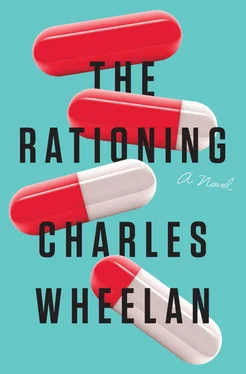“Okay, fine,” the Majority Leader continued. “They are likely to have a surplus and we need what they have. With the resources of this government, I find it hard to believe we can’t make some kind of deal happen.” He shook his head in mock amazement, as he had done so many times to such great effect at Rotary Club speeches and sports banquets and Fourth of July parades.
“Remember, we’ve already collected over a million doses,” the Chief of Staff answered. “Our allies have contributed what they think they can afford to do without. Now it gets harder.”
“Then isn’t this really just about China?” the House Speaker asked, though it did not really sound like a question. “Isn’t that what we should be talking about? That offer is on the table. That one solves our problem in one stroke.” We had been briefed that morning on the President’s upcoming visit to the South China Sea. If he was going to make that trip—land on the carrier, as our Pacific allies were expecting—he needed to leave in about forty-eight hours. One meeting in Hawaii had already been stripped from the schedule; there were briefings in Guam and the Philippines that could be canceled as well, buying more time. But two days was the max before Air Force One had to be wheels-up to make the South China Sea Conference, the culmination of America’s effort to build a bulwark against Chinese meddling in the region. The South China Sea Agreement had been in negotiation, on and off, since the Obama administration: nine signatory nations; 711 pages, including addendums on fishing, mineral rights, endangered species, even fighting piracy; and one high-profile landing by the U.S. President on an aircraft carrier to put a fine point on it all . No wonder the Chinese were willing to give us a million doses of Dormigen to ditch the whole thing.
The President slapped the conference table, somewhere between a tap and a bang, and said, “Why are we not making more progress on the virus? I don’t understand that. That’s where we need to beat this thing. We should not be begging the rest of the world to fix this problem. I need better options.”
The NIH Director answered quickly, perhaps a tad too defensive: “Mr. President, we’ve got three teams working around the clock on this thing, and they’ve made remarkable progress in a short amount of time. Usually it takes decades to confront a disease like this. We have weeks.”
“Then this is when you need to dig deeper, think differently,” the President demanded. “Can you not see the stakes here? What we need is the Manhattan Project and what we’re getting is a government task force.” The President looked around the room as he made his motivational speech, or whatever it was. He never made eye contact with me, but I could feel my neck and face flushing. I was, after all, the only one in the room specifically because of my purported expertise on viruses.
The Strategist said, “To be fair, the Manhattan Project took at least a couple of years.” He typed quickly on his phone. The President ignored him. After a moment of silence, the Strategist read from his phone, “Yeah, four years, one hundred and thirty thousand people. You got to love Wikipedia, right?”
“Maybe we should take a short break,” the Chief of Staff said.
“Fine,” the President agreed. “But I’m telling you, these options are not good enough.”
“One thing,” the Acting HHS Secretary said, raising his hand slightly. “I’ve said this before, but I think we need to discuss what happens if we come up short on Dormigen. I’m not saying that’s going to happen, but I think we need a plan.”
“I agree,” the Secretary of Defense said.
“That’s for Congress to decide,” the House Speaker said.
“No, actually, it’s not,” the President said.
The Speaker replied, “Since when does Congress not have a say—”
The Chief of Staff cut her off: “I’ll put it on the agenda for this afternoon.”
“One more thing,” the Communications Director interjected, speaking for the first time I could remember. Mostly he just sat at the end of the table checking his phone, reading and typing messages. He was a former cable news political correspondent, trimmer and younger than the others in the room, with a full head of hair and a nicer suit. He and the President were the only two who consistently looked good on television. “The blogosphere is starting to heat up,” he said, looking at his phone. “I’m getting some inquiries.”
“What exactly?” the Chief of Staff asked.
“The President canceled the Hawaii meetings, the Speaker has been at the White House for three days in a row, that kind of thing. They’re starting to smell a story.”
“Are there any leaks?” the President asked.
“Not yet.”
“Well, what are we supposed to do?” the President asked in the same impatient, ornery tone that he had been using for most of the morning.
“I’ve got some ideas,” the Communications Director assured him.
“Like what?” the President asked.
“We don’t need the whole group for that,” the Chief of Staff said, closing her leather legal pad holder. “Okay, everyone, let’s come back in twenty minutes.”
The participants stood and whipped out their phones and other devices. I got up and wandered over to a table with cookies and coffee, more out of a need to do something than because I needed cookies or coffee. The President’s comments had struck a chord. Were we really working as aggressively as we might on Capellaviridae ? For all the effort, we still had no new insights on lurking viruses. We had no clue what triggered Capellaviridae to turn fatal, not even any decent theories. I was the one who was supposed to be making progress on that front.
I made one call during that break and sent one text. The call was pure genius. The text turned out to be a complete disaster.
DURING THE BREAK, THE COMMUNICATIONS DIRECTOR USED his phone to show the Chief of Staff a short video clip of the Speaker of the House arriving at the White House. “CNN is running this over and over,” he told her.
“Do you think she tipped them off?” the Chief of Staff asked.
“Maybe. It makes her look presidential. Why else would a camera crew happen to be there when she arrived?” the Communications Director suggested.
“We can’t prove it,” the Chief of Staff said.
“Of course not. I just thought you should know.” The Communications Director was still looking down at his phone. “Oh, fuck,” he said.
“What?”
“Fox is reporting that there is some crisis related to the Saudi coup attempt.” He continued to read, and then said, “Where do they get this crap?” He began to read from his phone: “Sources close to the White House are reporting that Saudi Arabia’s nuclear strike force has been put on high alert in the wake of a coup attempt, prompting other nuclear powers in the region to respond in kind.” Saudi Arabia had only been a nuclear power for a handful of years. After Iran acquired the bomb, the other major powers in the region scrambled to even the playing field. The Saudis had the resources to spend freely, so they were the first to get the bomb (allegedly with the assistance of the Israelis, who believed that a nuclear Saudi Arabia would be the best counterweight to a nuclear Iran). Egypt followed soon thereafter. Given the instability of the region, there was a chronic fear of some kind of nuclear incident. A press person for the Joint Chiefs of Staff had refused to comment on the Fox nuclear alert story, which merely incited more interest.
I stood in a corner of the conference room, sipping coffee idly. The President’s admonition was replaying itself in my mind. We really did need the virus equivalent of the Manhattan Project. There was no excuse for not doing everything—anything—that might be remotely productive. With that in mind, I called Dartmouth’s Department of Biological Sciences, where I spoke to a friendly administrative assistant. Professor Huke had retired several years earlier, but he was still living in the area. She gave me his phone number. I gathered my thoughts for a moment and then dialed. Professor Huke’s wife answered. He was outside working in the garden, she said, and would call me back as soon as he came in.
Читать дальше












